
Marriage is a match made in heaven. Or is it, as a wife is not allowed to live with her husband. Here are the details of the famous Love-Jihad case in Kerala.
Hadiya, a Kerala-based Hindu girl Akhila who converted to Islam and later married a Muslim man, Shafin Jahan, is set to appear before the Supreme Court today. A bench headed by Chief Justice Dipak Misra will hear Hadiya’s testimony in the case. The National Investigation Agency (NIA) and Hadiya’s father K M Ashokan have contended that Hadiya had been indoctrinated by radical groups and her consent was not free.
Hadiya is expected to repeat at Supreme Court today what she told the media on Saturday — that there was no coercion involved in her marriage to a Muslim and she had embraced Islam voluntarily — her father’s lawyer is planning to counter it by raising the question of her “mental stability”, sources close to her family said.
“I am emotionally not in a situation where I can comment on the issue. But it is true that there is a history of mental illness in our family,” Hadiya’s father K M Ashokan said. Ashokan recalled that he had informed the Kerala high court during the ‘love jihad’ hearing that some of his close relatives were mentally unsound and it was possible Hadiya too had the same problem.
Ashokan’s counsel A Raghunath confirmed this. “We had argued at the HC that mental illness is hereditary and had produced medical documents about two close relatives of Ashokan being mentally unsound. We have filed the same at the SC. We haven’t filed any documents yet to prove that she is mentally unsound,” he said.
Even before leaving for Delhi on Saturday, she told media at the Kochi airport, “I am a Muslim. I have embraced Islam of my own free will. Nobody has compelled me to become a Muslim. I want justice. I want to live with my husband.” She was accompanied by her parents.
The Kerala HC had called Hadiya a ‘gullible’ person. In its judgment annulling her marriage to Shafin Jahan, it observed, “Our interaction with the detenue when she was brought before us, gives us an impression that she is only an ordinary girl of moderate intellectual capacity… According to police, and the senior government pleader, she has been made to believe that she would go to hell if she did not accept Islam… She also appears to be a gullible person. Hostility to her parents also has been instilled into her.”
The apex court had in August asked the NIA to probe the case after Jahan had challenged Kerala High Court which nullified their marriage and gave Hadiya’s custody to her father KM Ashokan.
Also, the NIA, in its earlier report to the court, had claimed there was a “well-oiled machinery working in Kerala” involved in indoctrination and radicalization of women, and 89 such cases had been reported. It claimed that the court could invoke parental authority even if Hadiya was an adult, as her case suggested that she was radicalized.
Ashokan had also alleged that she had been indoctrinated by radical groups.
The Supreme Court had said that only after talking to Hadiya, it could consider the NIA’s and Ashokan’s contention that Hadiya had been indoctrinated.
Meanwhile, last week, her father had urged the court to conduct in-camera proceeding due to the communally sensitive nature of the case and threats from radical elements to him and his family.

Post Your Comments